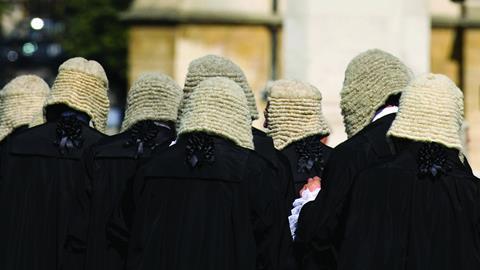Campaigning thinktank Policy Exchange continues to fuel debate about the limits of judicial independence. What if critics who allege ministers are bent on constitutional vandalism have got it wrong?
A truth widely acknowledged in legal circles is that judicial independence is a delicate flower, under threat from the bulldozers of populist ministers and the popular press. But what if we have got it wrong? What, for example, if the notorious 2016 ‘Enemies of the people’ Mail headline was not a sign of an endangered judiciary but, rather, a symptom of its strengths?
That was the bold hypothesis presented by a legal academic last week to an audience including the lord chief justice and the deputy president of the Supreme Court. Professor Graham Gee, a specialist in the judiciary from University of Sheffield, was opening a new front in the Judicial Power Project, a seven-year-old campaign by free-market thinktank Policy Exchange.
The campaign, which has produced an extensive corpus of publications, aims to catalogue and critique what it says is the expansion of judicial power at the expense of legislative and executive authority. It is regarded with some scepticism in legal professional circles – partly because, like many right-of-centre thinktanks, Policy Exchange is coy about its funders.
Another allegation is that the Judicial Power Project aims to put the judiciary under the political thumb – for instance, a report last year proposed that the lord chancellor should have a bigger role in appointing the most senior judges.
It vigorously denies any such ambition. ‘Critiquing judicial power is not only entirely consistent with judicial independence but is motivated by support for it,’ Gee said last week. The whole point is to protect judges from the charges of politicisation that will follow the more they stray beyond the traditional parameters of their role. In other words, setting boundaries on judicial power is for the judges’ own good.
Gee acknowledges that not everyone is persuaded that judges are straying. ‘We are at a really interesting moment... because there are rival assessments of that cultural context in which our judges now operate. On the one hand, those concerned about ascendant judicial power view the government’s desire to pursue reforms that seek to re-establish the proper parameters of the judicial role, as a wholly proper exercise of political responsibility.’ On the other hand, supporters of an expanded judicial role view such reform as potential threats to judicial independence, with some describing ministers as ‘bent on constitutional destruction’ and pursuing ‘a vengeful war on judges’.
‘In the face of such opposing assessments, a clear understanding of judicial independence is essential.’ And here, he said, is where the ‘legal establishment’ gets six things wrong. They are:
- To view the relationships between politicians and judges in overly negative terms.
- To overlook the many reasons, including self-interest, why governing politicians generally respect an independent judiciary.
- To assume that tensions are a threat. ‘Tensions are a sign of where the rule of law operates,’ Gee said.
- To put court judgments beyond political scrutiny. ‘Democracy means being subject to scrutiny even when it is disagreeable,’ he said. This includes the ‘Enemies of the People’ headline, which he described as ‘ill advised and excessive’ but not something to get upset about. Indeed, he suggested that judges who feel pressured by criticism may be unfit for office.
- To cling to what Gee described as a ‘saviour theory’ of the lord chancellor, ‘which greatly exaggerates this office’s role as guardian of judicial independence’.
- And finally, ‘It is a mistake to assume that the most pressing threat to an independent judiciary lies in political interference; political indifference might pose the more serious long-term challenge.’
The legal establishment’s likely reaction to the list was summed up by Lord Hodge, deputy president of the Supreme Court, who was present to lead a vote of thanks. He could agree that judgments must be open to criticism – but ‘what’s important is the way disagreement is expressed.’ He also took issue with the ‘saviour theory’, pointing out that the lord chancellor has a statutory role when debate becomes intemperate. ‘In my view there’s a specific duty on the lord chancellor to respond promptly when lines are crossed.’
Another member of the audience, the Rt Hon Suella Braverman QC MP, attorney general, declined to join the debate. But Policy Exchange has a track record for influencing Conservative government policy.





































No comments yet